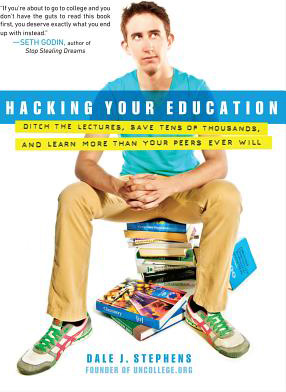Crash a Class
This hack is pretty easy; I want you to do what I did at community college and what Kirill did at Stanford. I want you to go to a university that you don’t attend and show up for a class. It doesn’t matter which university, and it doesn’t matter what class. I can’t guarantee what you’re going to learn, but I can guarantee that you’re going to learn more by crashing a class than you would sitting at home on Facebook.
1. Identify a university near you. CollegeBoard is helpful for this.
2. Go onto the university’s website and look up the course schedule. Choose a class that interests you and note the time. You can find the course catalogs on the university website that will list the time and location of classes.
3. Be sure to choose classes that are in big lecture halls so no one will notice or care that you drop in.
4. Show up to the next class. Participate in class. Pretend you’re a student. Ask a fellow student what last week’s homework assignment was.
5. If you enjoyed the class, go again. If not, choose a different class and repeat until you find a class you enjoy.
Reach Out to an Expert
If you aren’t enrolled in college, you can easily seek mentorship, guidance, and advice from professors. Office hours are open to anyone, not just students. If you’re genuinely interested in learning, professors are often happy to share their knowledge, no matter if you’re a student or not. Universities post directories of their faculty public on their websites, so you can easily find email addresses and sometimes even phone numbers. I know there is a subject that you’d love to learn more about. Is it biology? English? History? Math? Whatever it is, chances are that your local university has someone that knows about it.
1. Identify the subject for which you want to speak to an expert.
2. Find a local university. CollegeBoard has a nice directory if you don’t already know one close to home.
3. Browse the university’s website by department, looking for the likely experts. Sometimes this is easy: Math people are in the math department. Other times this can take more sleuthing: for example, statistics experts might be a social science department.
4. Once you’ve found that person, find her email address. If not already listed on the department web page, universities have a “people search” function that you can access from the home page.
5. Send your potential mentor an email. The key to sending such an email is twofold: Ask for a very short amount of time. Ask for something very specific.
Apply for an Incubator
Increasingly, cities are becoming the new universities. With spaces like YCombinator, Techshop and General Assembly, hackademics have lots of opportunities to come together and learn. But these aren’t the only incubators that exist; there are many others in cities around the world. Here’s how to find an incubator space near you:
1. Google “startup incubator in ______” and insert the name of your town or state.
2. Find out when the deadline to apply is, and send in an application. If you don’t have an idea now, think of one.
3. Even if you’re rejected early in the process, you’ll still have learned something through the process of applying.
4. There are incubators for specific types of companies (health companies, for example) and incubators for social enterprises. We keep a list at Uncollege.
5. Some incubators are very competitive; YC accepts only 2 percent of applicants. But that’s because YC is in the center of Silicon Valley. If you want a better shot at getting funding for your idea, apply to incubators in less-sexy areas: Kansas City or Minneapolis or Calgary.
 Dale Stephens, founder of UnCollege, a movement that challenges the notion that "college is the only path to success," has some advice for students who are willing to take the nontraditional route between school and work.
Dale Stephens, founder of UnCollege, a movement that challenges the notion that "college is the only path to success," has some advice for students who are willing to take the nontraditional route between school and work.
